Advancing the National Adaptation Plan of the Maldives
The Republic of the Maldives is a Small Island Developing State (SIDS) and is one of the smallest atoll island nations globally. The government of Maldives has expressed concerns about the impacts of global warming on the country as the geographical characteristics of the country — comprising small, low-lying atoll islands — makes the Maldives extremely vulnerable to the negative impacts of climate change, particularly coastal erosion and sea-level rise. A 0.5 to 0.8 meter rise in sea level by 2100 — as predicted by global climate change models — would lead to a loss of most of the land area of the Maldives. As the islands of the Maldives are highly vulnerable to inundation, sea-level rise will also exacerbate the existing problems of beach erosion and salt-water intrusion, threatening the country’s limited freshwater resources. Rising sea levels and increasingly intense storm surges will also cause significant economic losses and damage to critical infrastructure. In addition to sea-level rise, the coral reefs surrounding the Maldives are at risk from rising seawater temperatures, as well as pollution. These reefs support both the country’s tourism and fisheries sectors which, together, underpin the economy of the country.
In response to the climate threats facing the Maldives, the country has undertaken a number of climate-responsive development planning and adaptation processes the NAPA, NDC, national communications, MCCPF and Strategic Action Plan, as well as projects and programmes funded through GCF, GEF, LDCF, AF, and GCCA. In addition to identifying the sectoral priorities and strategies that underlie the country’s national adaptation priorities, these projects have established a baseline from which cooperation and partnership opportunities of the NAP process can be advanced.
Despite the steps already made in terms of Readiness for long-term adaptation, several barriers remain that restrict the national adaptation planning (NAP) process. these include: i) weak institutional and coordination mechanisms for planning climate change adaptation (CCA); ii) limited capacity for planning CCA, including limited technical capacity to assess climate risk vulnerability or appraise adaptation measures; iii) limited and uncoordinated access to financing to reduce vulnerability and increase adaptive capacity; iv) limited access to, and sharing of, reliable climate change information and knowledge for decision-makers and stakeholders; v) lack of systematic integration of CCA into national, island and sectoral development planning and budgeting processes; and vi) lack of monitoring and reporting systems to communicate results of adaptation measures to decision- makers and improve implementation by evaluating lessons learned.
The overall goal of the proposed project is to reduce the vulnerability of the Maldives’ population to climate change impacts through enhanced capacity for planning, implementing and monitoring adaptation interventions. By supporting the Government of the Maldives in undertaking a process for formulating and implementing its NAP — in accordance with the country’s National Climate Change Policy Framework and in line with national priorities, including those identified in the 2020–2024 GCF Country Programme — the proposed project will achieve this goal and overcome the identified barriers through four participatory, gender- responsive and socially-inclusive outcomes, focusing on: i) enabling national government and non-state actors/stakeholders to advance the NAP process through strengthened institutional arrangements and improved technical capacity; ii) identifying, analysing and prioritising climate change impact and adaptation information to inform adaptation planning in the Maldives; iii) developing a funding strategy for the implementation of national adaptation; and iv) enhancing the capacity to monitor, report on, and learn from the NAP process in the Maldives.
Implementation of the proposed outputs will advance CCA in the country and build resilience. It will also support the integration of CCA into relevant new and existing policies, programmes and activities in a coherent manner. The guiding principles of the NAP process, including social and gender considerations, will be emphasised throughout planning and implementation of the proposed project. A number of different beneficiary groups will benefit from the implementation of the proposed project activities. The capacity of national and local government will be strengthened for adaptation planning, with training provided to the Ministry of Environment, Climate Change and Technology — notably the Climate Change Directorate and the Maldives Meteorological Service — relevant line ministries at different levels of government and representatives of the Maldives National University and other relevant academic and research institutions. In addition, consultations and awareness-raising will actively include the private sector, research and academic institutions, development partners, non-governmental organisations and civil society organisations. Private sector engagement in CCA will be actively promoted, fostering increased investment in adaptation-related initiatives. Lastly, the general public will benefit from enhanced country-led adaptation planning and awareness-raising, prioritising the inclusion of women and vulnerable groups.
